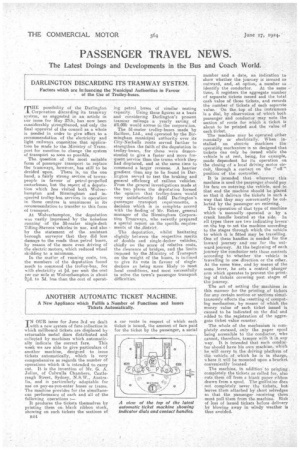PASSENGER TRAVEL NEWS.
Page 28

If you've noticed an error in this article please click here to report it so we can fix it.
The Latest Doings and Developments in the Bus and Coach World.
DARLINGTON DISCARDING ITS TRAMWAY SYSTEM.
Factors which are inlluencing the Municipal Authorities in Favour of the Use of Trolley-buses.
MHE possibility of the Darlington
Corporation discarding its tramway system, as suggested in an, article in our issue for May 27th, has no been considerably strengthened, and only the final approval of the council as a whole is needed in• order to give effect to a recommendation of the electricity and light railways committee that application he made to the Ministry of Transport for sanction to change the system of transport so soon as possible.
The question of the moSt suitable form of passenger transport to replace the tramways., however, has still to he decided upon. There is, On the one hand, a fairly strong section of townspeopie in favour of petrol-propelled motorbuses, but the report of a deputation which has visited both Wolverhampton and Birmingham and inspected trolley-bus services in operation iii those centres is unanimous in its recommendation to transfer to this form of transport.
At Wolverhampton, the deputation was vastly impressed by the noiseless _
running of the 38-seater single-deck Tilling-Stevens'vehicles-in use, and also by tbe statement of the assistant borough surveyor that they did less damage to the roads than petrol buses, by reason of the more even driving of the electric motors, which reduced wheel skidding to a minimum. In the matter of running costs, too, the members of the deputation found much to commend the trolley-bus,foe with electricity atd. per -unit the cost per car mile at Wolverhampton is aboet 20. to 3d. less than the cost of operat ing petrol buses of -similar seating capacity. Using these figures as a bade and considering Darlington's present tramcar mileage a yearly saving of £5,000 would accrue to the corporation. The 51-seater trolley-buses made by Reilless, Ltd., and operated by the Birmingham municipal authority. over . its City-Nechells route servedfurther to strengthen the faith of the deputation in trolley-buses, . for these were demonstrafed to give a faster and more frequent service than the trams which theye had displaced, and at the same time to 'command a larger revenue. A heavier gradient than, any to be found in Dar. liagton served to test the braking and general efficiency of railless vehicles. From the general investigations made at the two places the deputation formed the opinion that trolley-buses would very satisfactorily -fulfil Darlington's -passenger transport teqeirements, decision which is in complete accord with the finding of Mr. Baker, general manager of the Birmingham C,orporation Tramways, who recently prepared a special report on the specific requirements of the elistrict.
The deputation, whilst hesitating slightly between the respective merits of double and single-decker vehicles, chiefly on the score of relative costs, the clearance of bridges, and the limits imposed by the Ministry of Transpoet on the weight of the buses, le inetined to give its vote in favour of singledeckers as being more likely' to meet local conditions, and most 'successfully to solve the town's passenger transport. difficulties.
































